Manu National Park (part 2)

Caramor - sailing around the world
Franco Ferrero / Kath Mcnulty
Sat 28 Oct 2017 16:04
It was still dark when we set off the following morning for Pakitza, the furthest point up-river tourists are allowed. The boys were a bit grumpy because Lucho had decreed that they would cook lunch at the rangers' hut in Pakitza which had meant a big upheaval and a very early wake-up call to load all the gear into the boat. We passed a partly submerged log which, from a distance, looked like a whale jaw with teeth. On closer inspection, the 'teeth' turned into nighthawks. 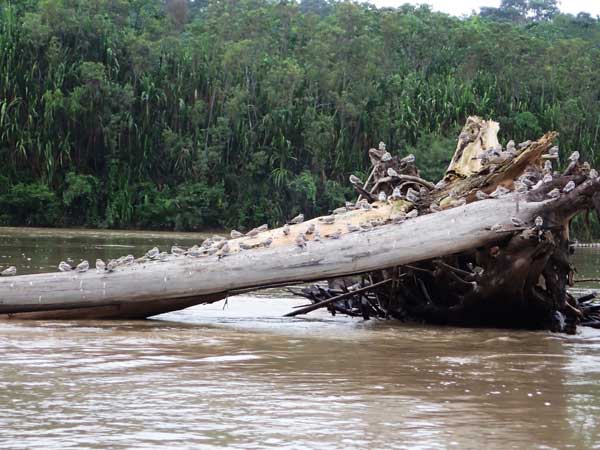 Nighthawks roosting On a high branch over the river, a family of monkeys were still soundly asleep. A rare chance to take a photo without them rushing around. 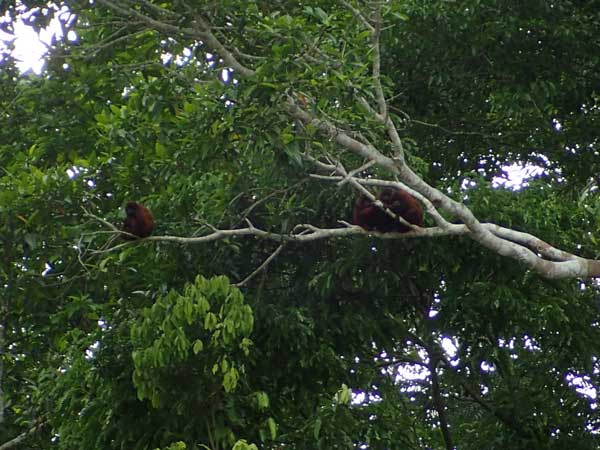 Brown howler monkeys asleep  Manu, early morning We broke fast at Pakitza and left the team watching football on the satellite TV with the rangers. We walked for a couple of hours in our welly boots to a mammal clay lick. Many mammals all over the world, including elephants, monkeys and tapirs, ingest clay. Often they will travel considerable distances to specific clay licks as these contain minerals and salts essential for their health. The clay also neutralises certain acids and toxins found in their food. We climbed up to the hide and waited... and waited. Franco, Bob and Lucho dozed off and still I waited. No tapirs came, though several birds wandered by. A bright green parrot with a buff neck and bright red shoulders sat on a branch for a while. Its bright shoulders were very distinctive and I was sure I would be able to identify it from the book. Later I realised that many Peruvian parrots are green with red shoulders and what I should have been looking at was the tail feathers and the colour of the feet. I never did find it in the book! Back through the forest we traipsed, it was the hottest time of the day and the animals were taking a siesta somewhere in the shade. We saw tapir prints and armadillo holes but no sign of life. Lunch was ready and the football match in full swing when we got back to the rangers' station. The heat was stifling so Franco and Bob took a nap. Outside I found a patch of damp soil visited by dozens of different butterflies, some larger than any I have ever seen before. I sat in the shade and tried to photograph them. 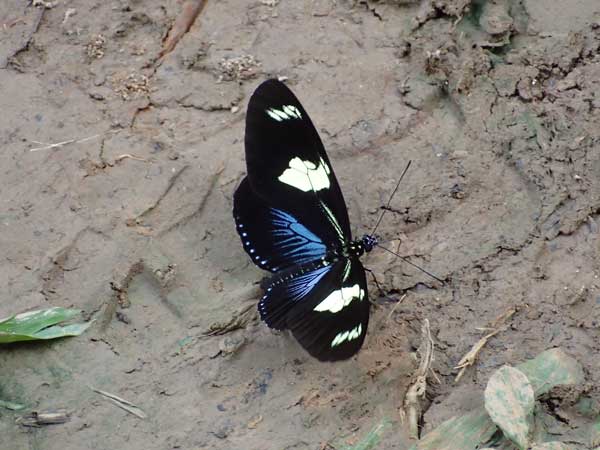 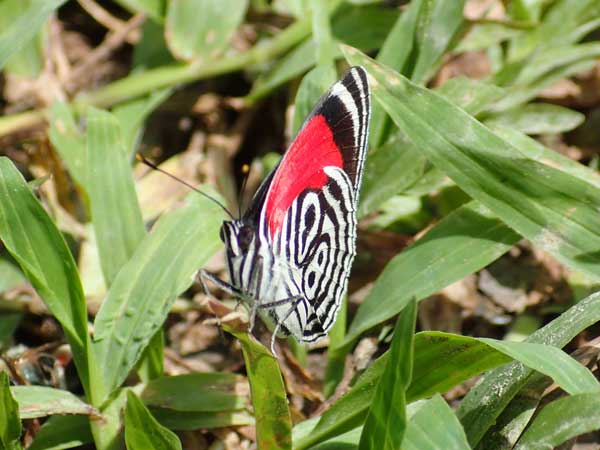 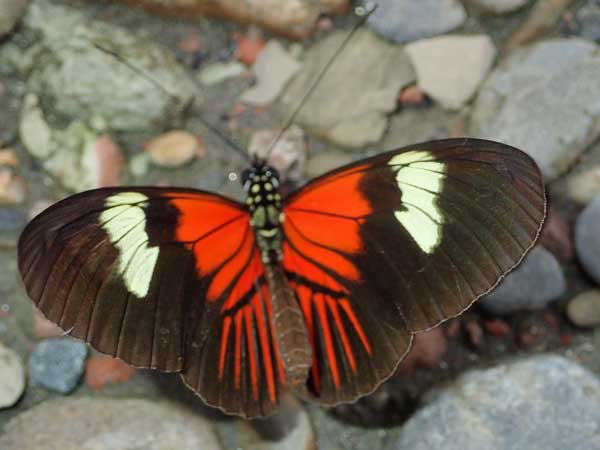 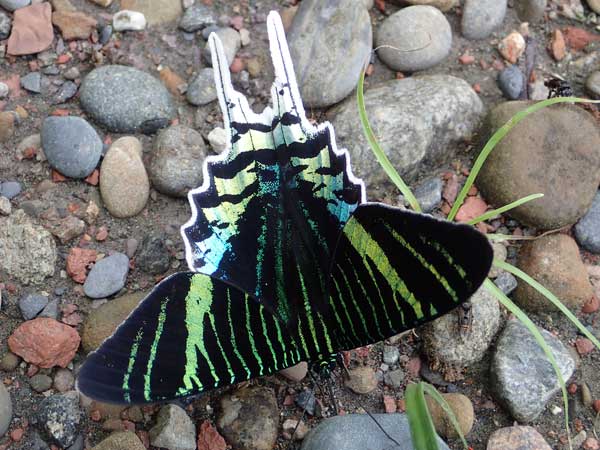 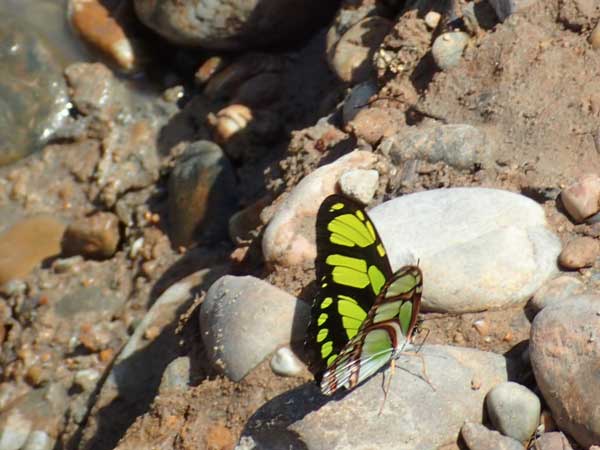 Butterflies 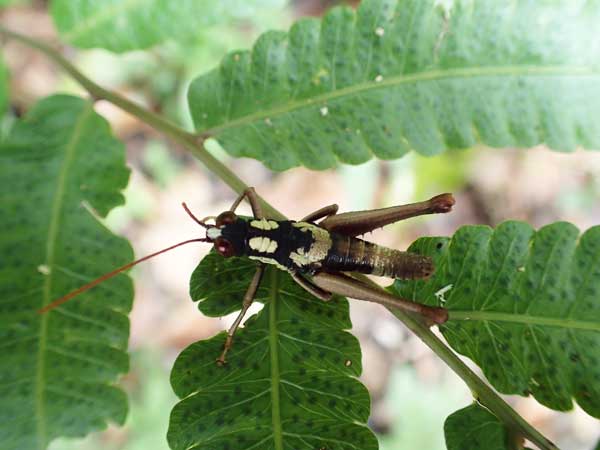 Cricket Lucho was beating himself up; no tapirs and still no giant otters, he felt he wasn't delivering. He announced that we would head back to Cocha Salvador on the way back to camp and try the other end of the lake for otters. We boarded the catamaran and the breeze blew us down the lake. Getting back would be hard work. Black spider monkeys were making a racket from the trees, a similar sound to the howler monkeys we had seen in Ihla Grande, Brazil. 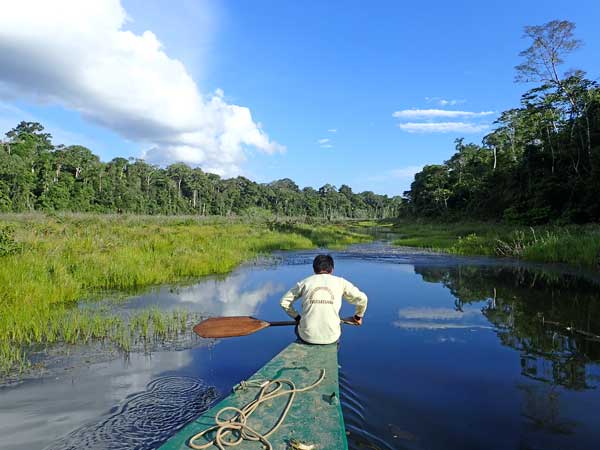 The end of Cocha Salvador 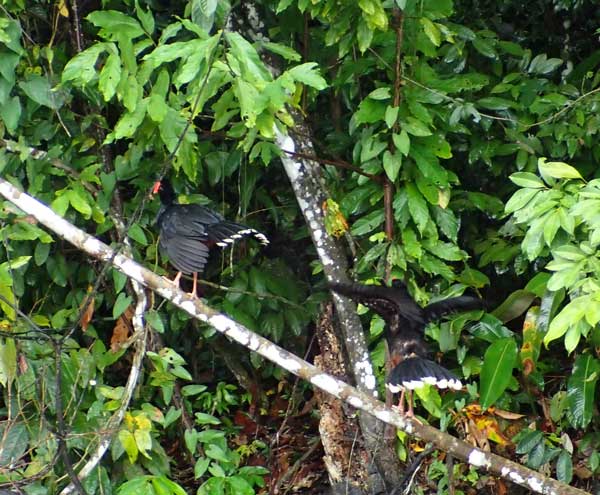 Horned screamers Still no giant otters. There was only one place left to search, the oxbow lake within walking distance from camp. We would visit at dawn. 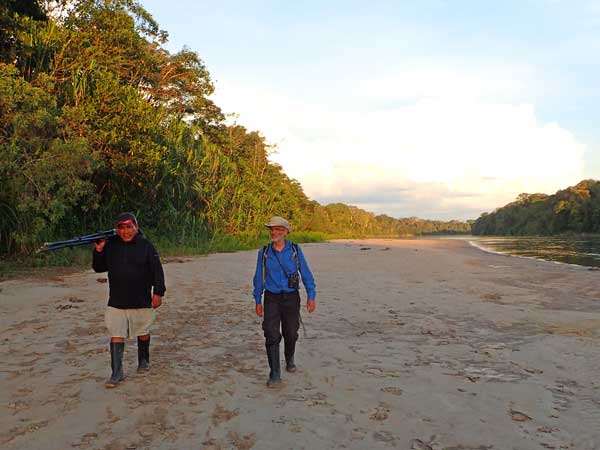 Returning to the boat at sunset "Another after dinner walk?" offered Lucho. We were exhausted but how could we refuse? "You guys are keen," enthused our guide. "Sometimes I have to go for walks on my own. The youngsters want to stay in bed with their girlfriends and the older people tell me they are on holiday and want a lie-in." Right by the entrance to camp, Lucho spotted a boa in a tree. 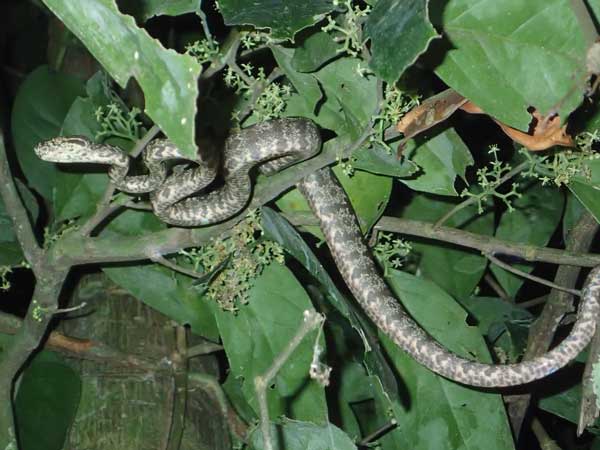 Tree boa The plan was to look for caiman on the river but the level was too high and the beeches covered, so instead we went looking for creepy-crawlies and frogs. 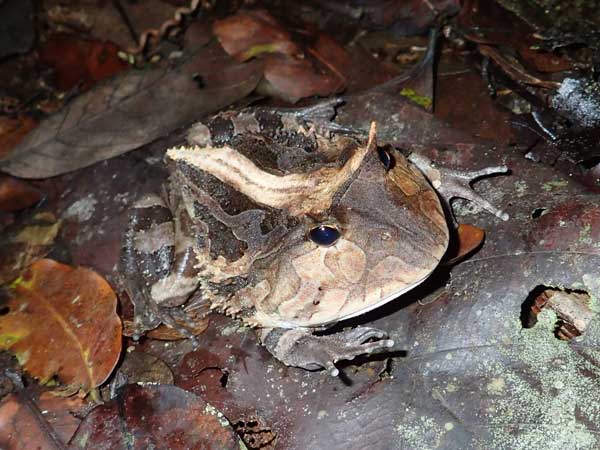 Horned frog 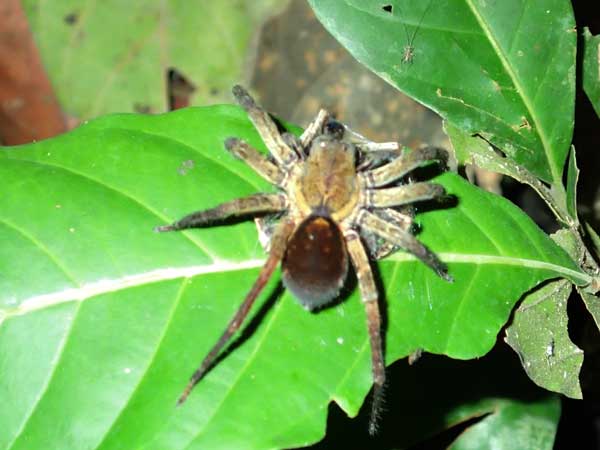 Tarantula, the bite isn’t dangerous No fireflies for me that night, I slept like the dead. By the crack of dawn we were packed and waiting for Lucho who was taking a shower. While we visited Cocha Otorongo, Juan Carlos and the others would break camp and pack everything into the boat. Otorongo doesn't have a raft, instead a tall scaffolding tower with a hide at the top. Again we waited, in silence. I had the impression that Lucho didn't really believe we would find otters here. After a long time he said: "Let's walk, we aren't seeing anything here." We clambered down the tower and set off along the path, parallel to the lake. Suddenly we heard the high pitched ululating sound that Cesar had mimicked a few days before: otters! Lucho started running, hoping to get to the lake in time to see them. We followed, crashing through the undergrowth. Monkeys in the trees, that we hadn't seen but who were obviously aware of our presence, panicked, convinced we were fleeing from a large predator, and ran off chattering through the canopy. We stopped and laughed. Our best chance of seeing the otters was to return to the observation tower. On the lake, we could see ripples but the otters remained just out of sight. After a while Lucho suggested we leave. Just at that instant, the first animal swam into view. Soon the others appeared, in all five or six otters, including a pup, and spent the next thirty minutes fishing the part of the lake in front of the tower. It was time to go, our guys were waiting. As we walked back, we met Cesar coming to look for us. Everything was packed in the boat and the crew were being eaten alive by sandflies. We hurried on. Once afloat, Climaco served up delicious pancakes for breakfast. We were starving. 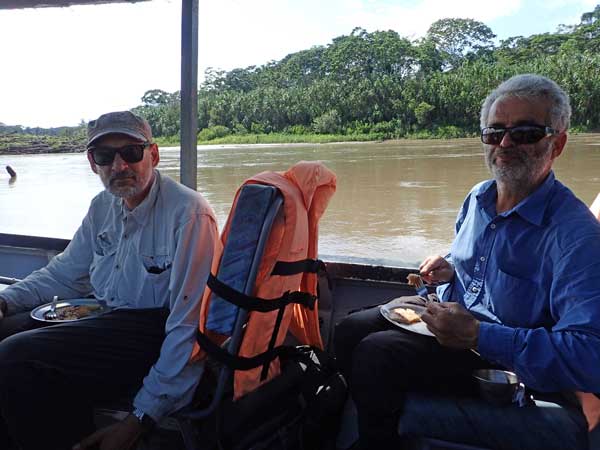 Breakfast We broke the journey with a short walk on the way back to Limonal where we signed out of the reserved zone. One of the rangers came down to the boat and weighed our rubbish; what goes in, comes out. We had been very impressed with the attitude of everyone we had met, particularly our team from Vilca Espediciones. These guys genuinely understand the importance of a place like Manu and the need to take care of it. Each one is passionate about the wildlife and respects the environment. By mid afternoon we were back in Boca Manu and were coming to terms with the fact that we would get back to Cusco only a few hours before our bus. Our main issue now was that all our clothes were filthy and nothing dries in the Amazon. "Use the laundry! You can hang your clothes in the boat tomorrow, the breeze will dry them in no time," offered Lucho. We stripped off and set to work. 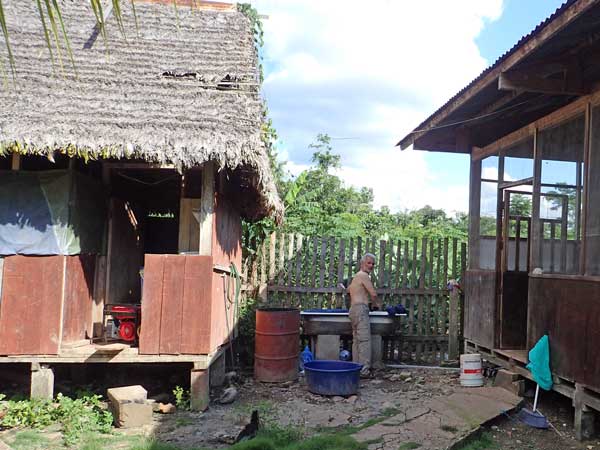 The laundry 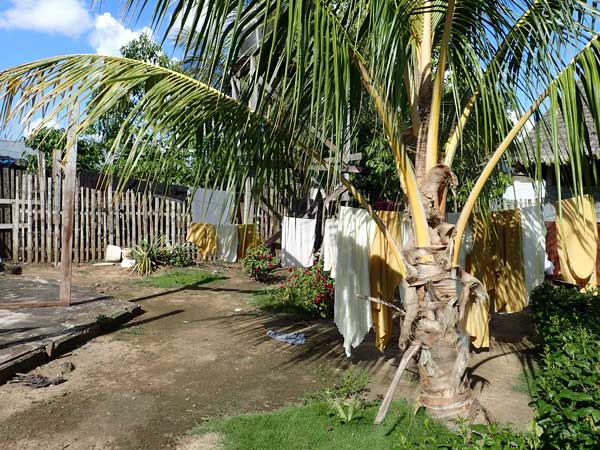 The drying yard It was thirsty work so we invited Lucho to join us for a well deserved drink. Amazingly the shop had cold beers and sodas, despite the village generator not coming on for another couple of hours. 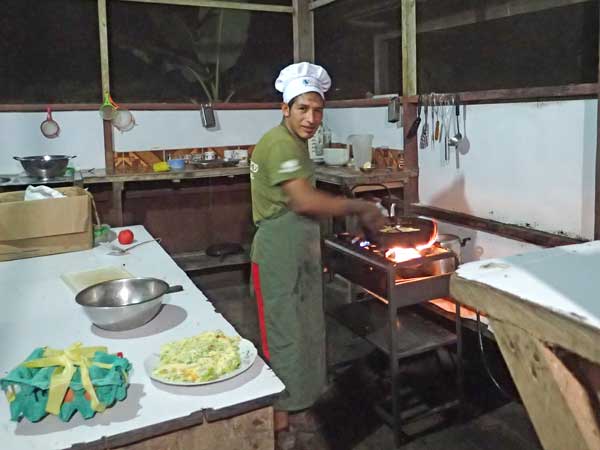 Climaco cooking a veggie dinner (we were out of chicken) in his Chef hat With the boat packed the next morning, we headed for a parrot clay lick at the entrance to the Manu River. We had passed it on the way in but there hadn't been any birds because of the rain. Lucho was puzzled by the low level of activity, until he spotted a hawk flying overhead, not surprisingly the parrots were keeping a low profile. As we got closer, we realised they were using overhanging vegetation to visit the lick undercover. 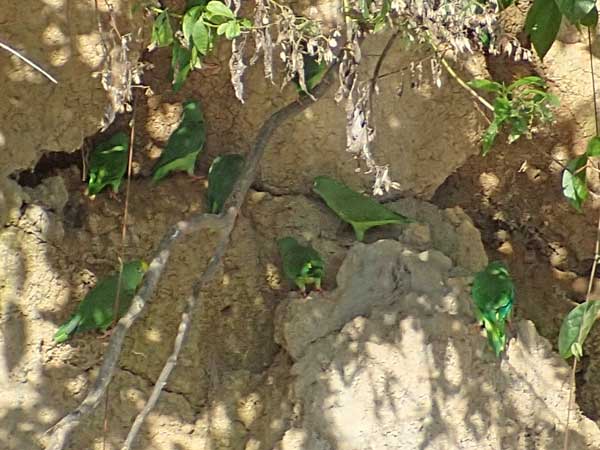 Parrots on clay lick Cesar steered the boat towards the shore, we were stopping off again at Diamante. Sat on the bank was an elderly lady who chatted with Lucho and invited us ashore. Without the breeze generated by the motion of the boat, the heat was stifling and I was sweating profusely in my thin cotton shirt. As I disembarked the woman held out her hand to shake mine. "Gosh, your hands are so cold," she said. "The story of my life," I thought, "but here, in a tropical jungle!" All things are relative, I suppose. The householder, a matriarch about my age welcomed us warmly from her hammock. Her home was a large platform on stilts with a palm roof. One corner was the kitchen and the rest living space where the hammocks were strung. What better form of air conditioning than no walls at all? Laura, a younger woman, asked if she could have her photo taken with us and a young lad hanging around took it with her mobile phone. We were invited to drink 'masaco', a very thick fermented drink made from maize and yucca. Franco didn't like it. I thought the mildly sweet taste was pleasant enough but the thickness took some getting used to. Apparently if you drink a lot of it, it plays havoc with your bowels. A fruit fell from a tree and missed Bob's head by inches. "Eat it!" our host shouted over. It was sweet and delicious but didn't have much flesh. It was called 'capiragua', or something along those lines. On the way back through the village we stopped at the school mistress's house. She handed out freshly boiled aguaje, the palm 'fruit' we had tried previously. At another house a man appeared with a packed travel bag and asked if he could he grab a lift with us up river, he was heading for Cusco. Lucho asked if we didn't mind. It was beginning to make sense, Lucho stops off with tourists who get a chance to try 'aguaje', 'masaco' and other products and in exchange the boats offer a much needed transport service. Cesar had moved the boat to the main landing pontoon at the Machigengua end of the village. By the time we got to the bottom of the stairs, Lucho had disappeared. He came back a while later, apologised for eloping, and as we settled into our seats, offered around a plastic bag. "Marinated pork. Want some?" It didn't taste like pork to me, much drier and gamy. It was tapir. Motoring back up the Madre de Dios was hard work against the current and Cesar was concerned for the propeller which frequently scraped the bottom. Bob mentioned he needed to go to the bathroom so Cesar pulled over to the bank. Lucho announced: "Public toilets!" Bob, maybe thinking there were physical facilities, asked: "For men?" "Men's toilets 100m into the jungle, real men's 200m." Specified Lucho. All morning we had been looking out for jaguars, Bob didn't go far. The water in the Madre de Dios River is a lot cooler than the Manu, so there are no caiman, no piranhas and generally fewer species, moreover it flows through the 'cultural zone' which is heavily impacted by humans. After the amazing diversity of the Manu, we were resigned to not seeing any new animals but we were in for a few surprises, including a pair of roseate spoonbill and a black hawk. 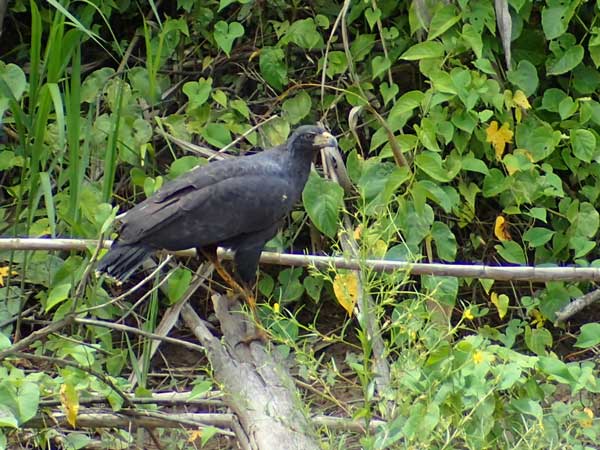 Black hawk 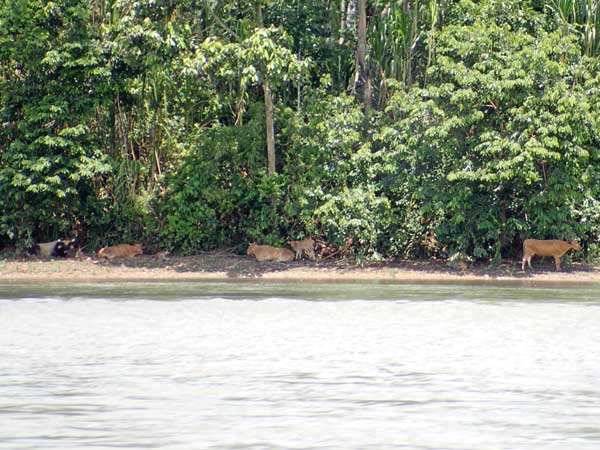 Cattle on the shore Cesar went along the shingle beach where we had dropped off our Brazilian friends and we tied up to boulders, for the night. We walked up to Paititi Lodge where I happily wasted a couple of hours trying to take photos of humming birds. There was plenty of other entertainment: a five year old little boy who's dream is to own a bicycle (his parents are probably still cursing me for mentioning the b****** word) when he lives on a steep muddy bank with a fast flowing river at the bottom; a rescued juvenile chestnut-fronted macaw who swings on the electricity lines; and a dozen other tourists on the four day tour. 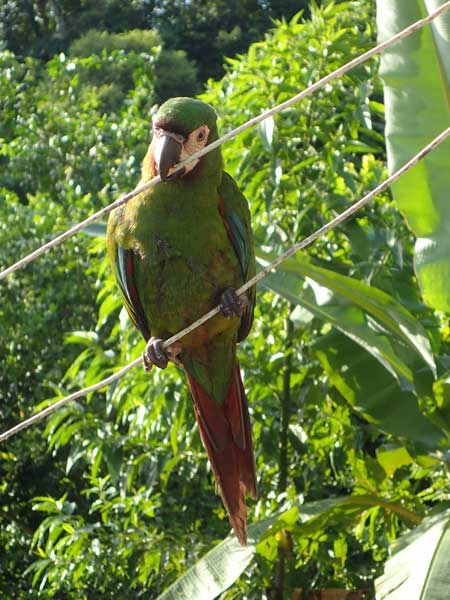 Chestnut fronted parakeet swinging on the electric wires In our room, it was downhill to the bathroom and uphill back to bed. Somebody had kindly propped up one side of my bed so that it was level but Franco's was on a slope. As we turned off the light, a frog started bellowing just outside our window and we honestly thought we wouldn't get a wink of sleep. The next time we opened our eyes, it was morning. 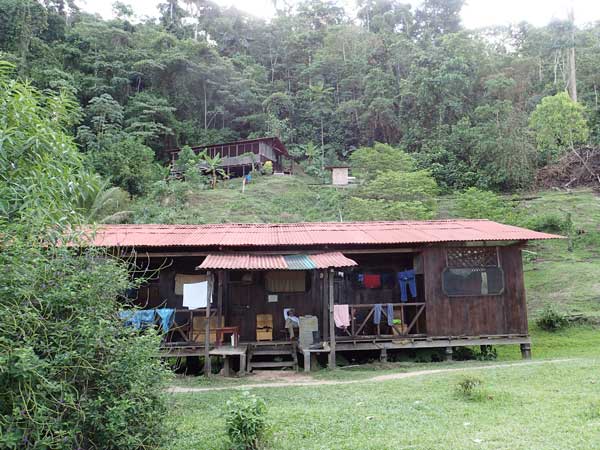 Paititi Lodge 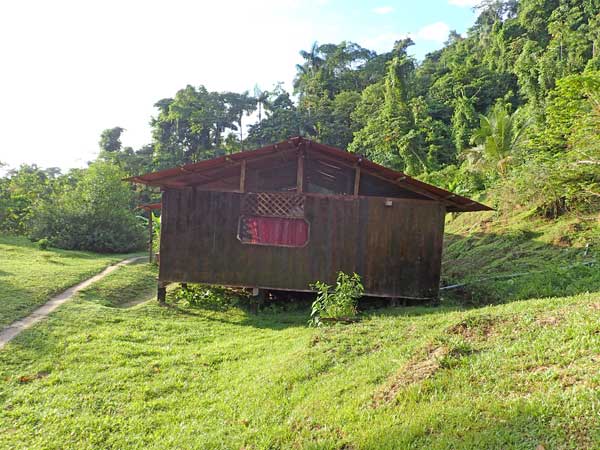 Not quite level 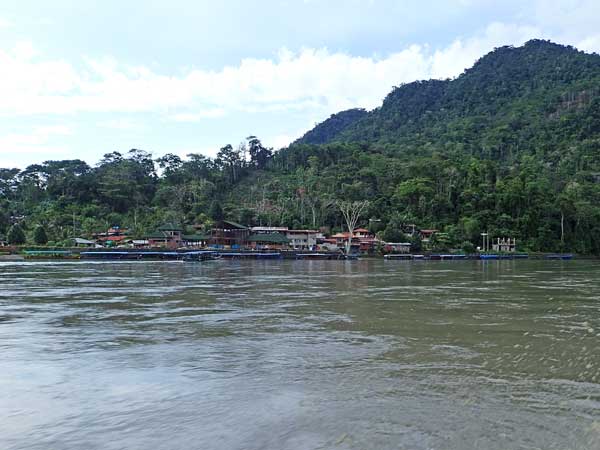 Atalaya from the river 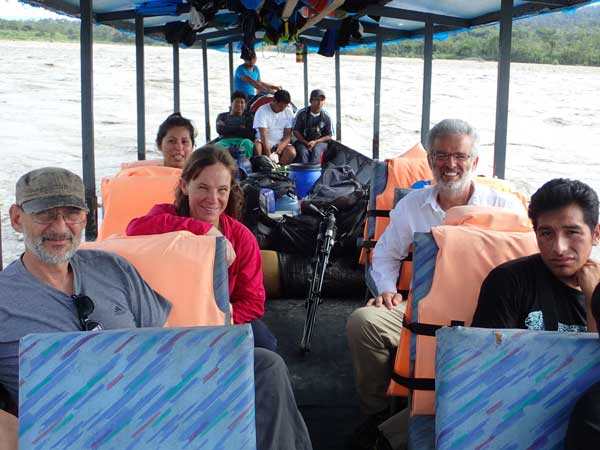 From left to right: Bob, a girl who cooked for another group, Kath, Franco and Climaco It took less than an hour in the boat to get back to Atalaya. The Vilca minibus was waiting. Our driver was excellent, making good time at a comfortable pace on the terrible road. As we crossed the bridge into Pilcopata, the village where we had spent the first night, Lucho in the front seat cursed out loud. A shock absorber had pierced the bodywork and was sticking out in the passenger footwell, something would need to be done. It took a couple of hours but remarkably, a street mechanic somehow managed to fix the problem. Our coach was at 8:30pm, it now looked like we might get back to Cusco around 6:30. 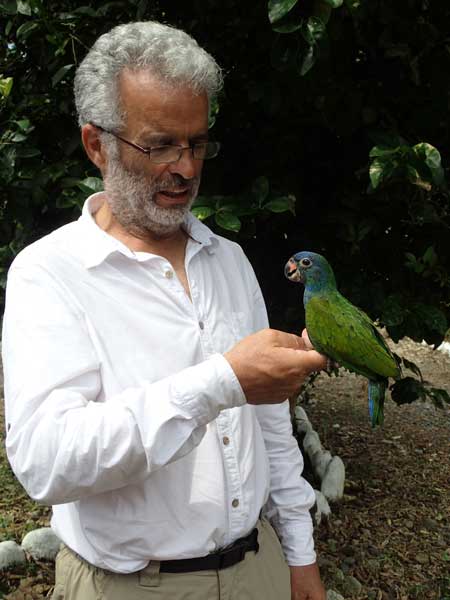 Franco making friends while we returned the welly boots to the lodge 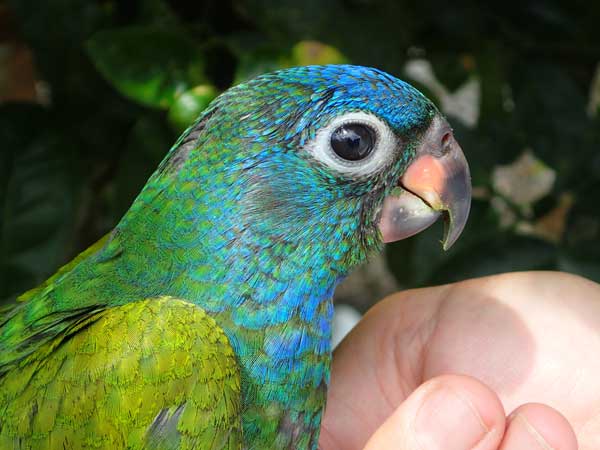 Rescued pet, now free to leave whenever he likes At the top of the pass, an Andean fox licked its chops outside the shack selling roast guinea pig. 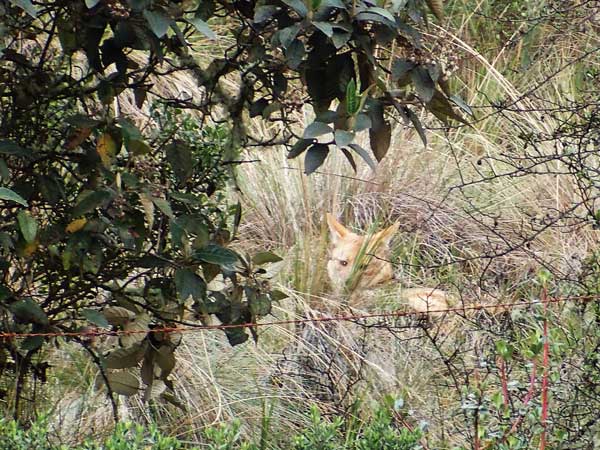 Andean fox at the top of the pass On we went with the occasional toilet stop. At Paucartambo, the driver told us we had an extended break. A rear tyre had developed a huge bulge so he needed to change the wheel. One of the questions in the trip evaluation form we had filled in the night before was "Is the driver clean?" It had seemed a very strange question at the time (we were all much more concerned with how well he drove the minibus). We asked if we could have the forms back because by now our poor driver was looking very unclean indeed, he had dust and grease all over his clothes and black streaks on his cheeks. His ability to fix the van, however, had been second to none! ... ETA 7:30? By five thirty we were nearing the Cusco suburbs but it always takes forever to get through town (even longer when you are on a schedule!). Lucho announced that we would all be dropped off near the main square which suited us. In the end we made the bus to Puerto Maldonado with a couple of hours to spare; just time enough to sort out our kit at the hostel and eat a large chunk of chocolate cake at JC Café, our favourite in Cusco. |